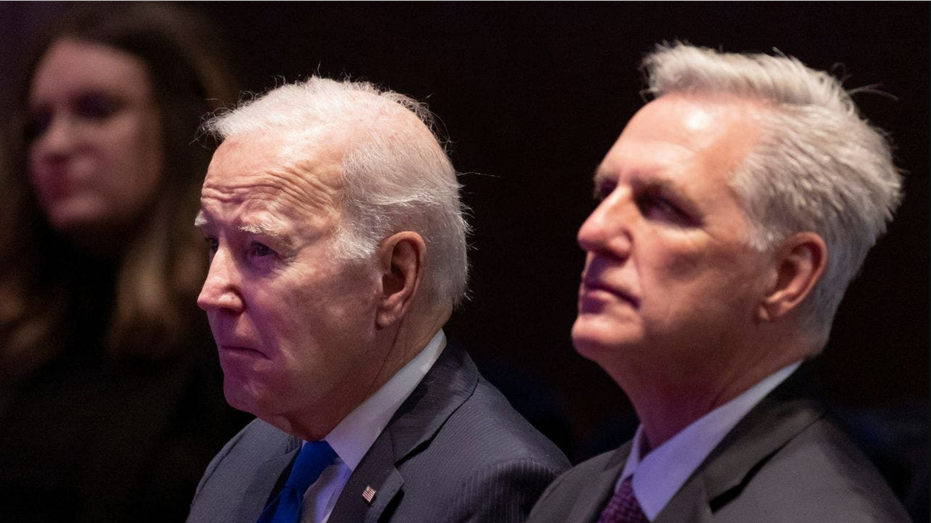FOX Business host Larry Kudlow calls out President Biden’s big government policies and asks Republicans to produce a prosperity agenda on ‘Kudlow.’
After the Pentagon, once again, failed a comprehensive financial audit, a group of bipartisan legislatures are introducing a bill to incentivize government spending transparency by imposing a penalty for any part of the department that fails to undergo a clean audit.
The audit, completed in November 2022, is the fifth comprehensive review the department has ever completed since 1990, and the fifth where auditors were unable to find sufficient record keeping for the Department of Defense (DoD) to pass a clean audit.
Texas Representative Michael Burgess introduced the “Audit the Pentagon Act,” a bipartisan bill with Texas Rep. Barbra Lee, Arizona Rep. Andy Biggs and Wisconsin Rep. Mark Pocan on Thursday, April 27.

The Pentagon logo is seen behind the podium in the briefing room at the Pentagon in Arlington, Virginia, U.S. (REUTERS/Al Drago/File Photo / Reuters Photos)
Rep. Burgess says that the bill hopes to, “demand transparency and accountability” from government agencies, noting that the DoD’s audit failure is “unacceptable.”
PERSONAL FINANCIAL EXPERT SHRED US OVER ‘RIDICULOUS’ RUNAWAY SPENDING: WASHINGTON ‘HAS NO BACKBONE’
“As stewards of taxpayer dollars, it is our responsibility to demand transparency and accountability from all government agencies, including the Department of Defense,” Rep. Burgess said in a statement. “It is unacceptable that the DoD has yet to complete a full financial audit, unlike other major agencies.”
“As stewards of taxpayer dollars, it is our responsibility to demand transparency and accountability from all government agencies, including the Department of Defense.”
The Republican lawmaker noted that in the November 2022, the DoD was unable to account for 39% of their assets.
“Can you imagine a Hertz rental car business being unable to identify 39% of their vehicle fleet,” Burgess told Fox News Digital. “The concept of every federal agency being able to pass an audit actually goes back to the presidency of George Herbert Walker Bush in 1990. They’ve [the DoD] had some time to work on this. It’s not unreasonable.”

People walk outside the U.S Capitol building in Washington, June 9, 2022. (AP Photo/Patrick Semansky, File / AP Newsroom)
The department has trillions of dollars in assets and receives $773 billion dollars annually, yet the department has never been able to produce a comprehensive list of its assets and liabilities in a year.
For the past five audits, the DoD’s audit has resulted in a “Disclaimer of Opinion,” meaning that the auditor was unable to get enough records to form a thorough assessment.
HOUSE REPUBLICAN LEADER SAYS DEBT LIMIT VOTE MUST BE GOP’S TOP PRIORITY
“It’s really not acceptable for just a collective shrug of the shoulders and say, ‘Well, we just couldn’t do it’,” Burgess said. “This is important. Other work they [the DoD] do is important. In no way does this diminish the importance of what is perhaps our most profound requirement of the Constitution, and that is to provide for the defense of our nation, but you also need to do so responsibly. And the Pentagon does need to be able to account for the moneys it’s getting and how it’s being spent.”

The Pentagon made its biggest budget request ever, asking for $842 billion. (AP Newsroom / AP Newsroom)
Burgess noted that the “Audit the Pentagon Act,” is modeled to incentivize the DoD to be compliant with the law.
“While some progress has been made, more needs to be done to ensure that the DoD is fully compliant with the law,” Burgess said. “By incentivizing a full audit and reducing funding for unauditable departments, we can hold the DoD accountable and ensure proper oversight. Our duty to the American people requires no less.”
“We can hold the DoD accountable and ensure proper oversight. Our duty to the American people requires no less.”
If passed, the new legislation would require any component of the Defense Department that fails to pass a clean audit to forfeit 1% of its budget back to the Treasury, to be applied against the federal deficit.

U.S. President Joe Biden (L) sits next to Speaker of the House Kevin McCarthy (R-CA) during the National Prayer Breakfast at the U.S. Capitol on February 02, 2023 in Washington, DC. The National Prayer Breakfast is a yearly bipartisan event that brin (Kevin Dietsch/Getty Images / Getty Images)
The new bipartisan legislation comes as U.S. government’s deadline to raise the $31.4 trillion debt ceiling looms and President Biden and House Speaker Kevin McCarthy scramble to reach a deal to lift the debt cap.
While McCarthy is calling for trillions of dollars in spending cuts, Biden insists that any talks about government finances should not occur with the threat of an economy-wrecking default hanging over lawmakers.
GET FOX BUSINESS ON THE GO BY CLICKING HERE
“It’s going to be a tough year on budgeting and appropriations all the way around because of the amount of money, just the sheer volume of money that’s been spent in the first two years of the Biden administration,” Burgess said. “And we’re up against the debt limit struggle. That is what’s captured everybody’s attention, so this is very much going to be on people’s minds.”
